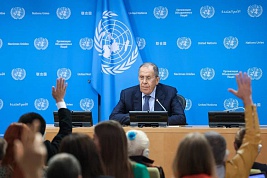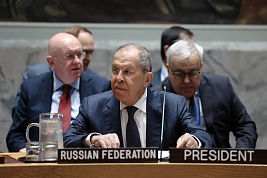Press release on consultations on security and stability in the South Caucasus
On October 4-5, Geneva hosted another round of consultations as part of the international discussions on the South Caucasus. Taking part were representatives of the Republic of Abkhazia, Georgia, Russia, the United States, and the Republic of South Ossetia. The consultations were co-chaired by the UN, OSCE and the EU. State Secretary and Deputy Foreign Minister Grigory Karasin led the Russian delegation.
The delegations of the Republic of Abkhazia, the Russian Federation and the Republic of South Ossetia voiced protest against Georgia’s tendentious statement in the UN Human Rights Council with the proposal to organise a monitoring mission in Abkhazia and South Ossetia, to which Georgia’s sovereignty has long stopped to apply. Participants in the meeting focused on Georgia’s continued destructive and politically charged actions on various international platforms without the participation of representatives of Sukhum and Tskhinval, which directly threatens the work not only of the humanitarian group, but the entire Geneva format. The Georgian “initiatives” are nothing but another attempt to satisfy its own political ambitions and traditionally have no practical value for the region’s population.
The representatives of Abkhazia and South Ossetia again pointed out the false facts that the Georgian Foreign Ministry uses in its reports on the human rights situation “on the occupied territories.” At the same time, Tbilisi keeps returning to this, intentionally hampering international communication of these two independent republics’ residents. Due to the unconstructive position of the Georgian party, the consideration of refugee issues during the Geneva discussions has practically come to a halt.
Participants reviewed the current situation on the Abkhazian and South Ossetian borders with Georgia. Most participants, including representatives of the EU Monitoring Mission to Georgia, said that the security situation is calm and stable with some incidents of mostly administrative nature. They are connected, to a large extent, with the locals lacking information about the exact borderline. Tbilisi is persistently refusing to discuss the demarcation, and Sukhum and Tskhinval are forced to do that by themselves. The South Ossetian representatives pointed out that since the beginning of this year, there have been seven registered border violations by Georgian police officers.
In this connection, it was noted that the current checkpoints on the Abkhazian and South Ossetian borders with Georgia are coping with their tasks and adequately providing for the cross-border traffic.
Regular meetings as part of the joint Incident Prevention and Response Mechanism (IPRM) in the areas of the Georgia-South Ossetia and Georgia-Abkhazia borders, as well as the use of hotlines make a major contribution to the security in the border areas of the three states.
The delegations of Abkhazia, Russia and South Ossetia again expressed concern about the stepped-up NATO military exercises in Georgia, whose scale and the number of NATO troops and military equipment grow every year. Tbilisi’s intensified military activity has again confirmed the need for further negotiations on the draft joint statement by the Geneva Discussions participants on the non-use of force as an interim step towards concluding a bilateral agreement on this important subject between Abkhazia and South Ossetia on the one side and Georgia on the other. This discussion was again postponed due to Georgian representatives’ refusal to compromise.
Participants in the Geneva Discussions confirmed their readiness to continue working on the ways to deal with humanitarian issues, including the preservation of cultural heritage, the exchange of archives, search of missing people, and the freedom of movement.
The next Geneva meeting is scheduled for mid-December 2016.


